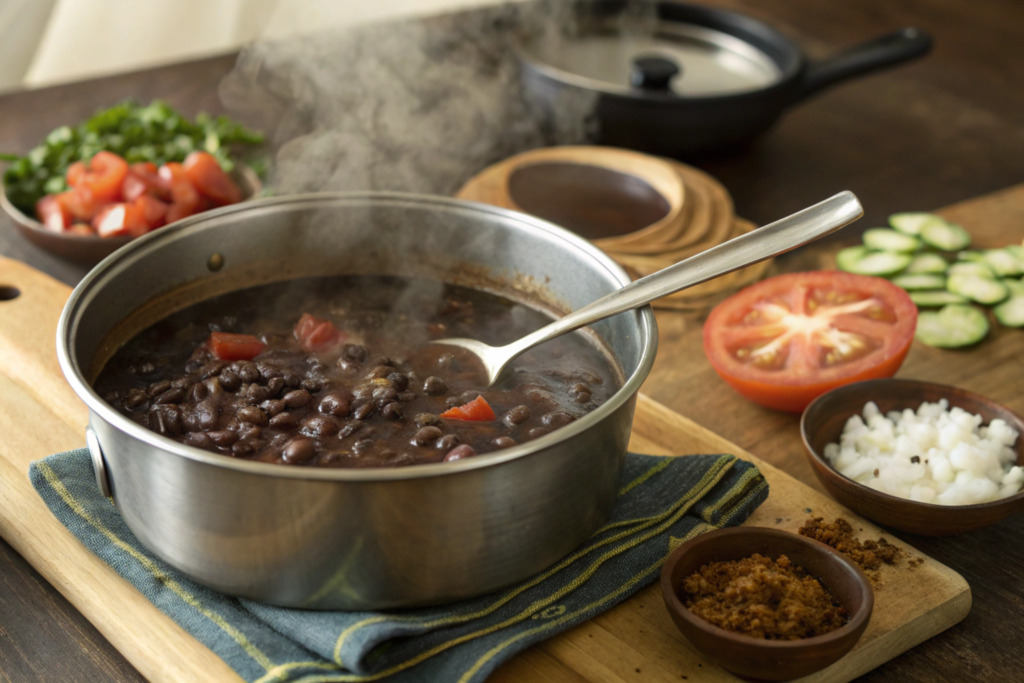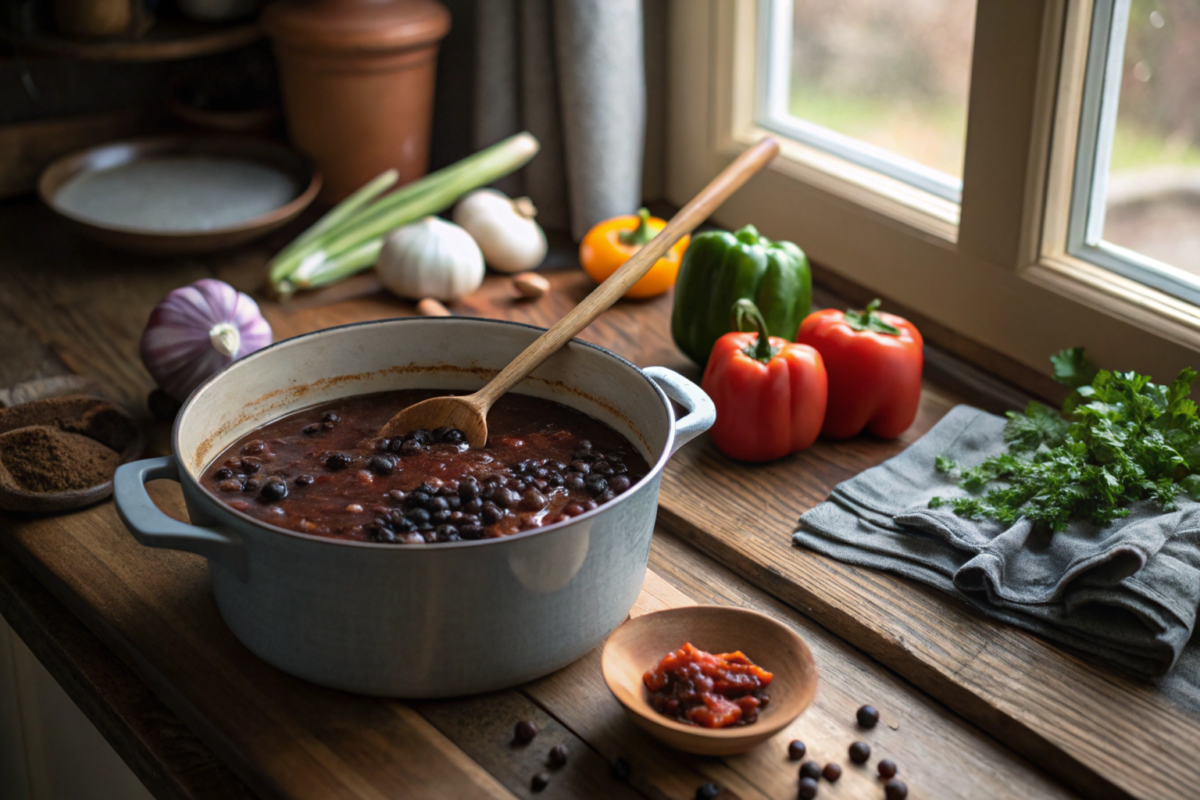Introduction
When it comes to cooking black beans, the age-old question remains: Do you need to soak black beans before making soup? This seemingly simple query often sparks debates among home cooks and culinary experts alike. While some argue that soaking is essential for faster cooking, others suggest it’s unnecessary. In this article, we’ll examine every angle of the soaking debate and explore the science behind your options. Whether you’re preparing a hearty soup or experimenting with new recipes, understanding the importance of soaking can impact flavor, texture, and nutritional value. This detailed guide will answer your questions and help you decide the best approach for your needs.
The Basics of Cooking Black Beans
Before diving into the soaking debate, it’s crucial to understand the basic principles of cooking black beans. These beans, packed with protein and fiber, require proper preparation to unlock their full potential. Traditionally, soaking beans overnight was a standard practice. However, with modern cooking methods like pressure cookers, many people skip this step entirely. Each approach has its pros and cons, but choosing the right method often depends on your available time, cooking tools, and personal preferences. From stovetop simmering to Instant Pots, the versatility of black beans allows for numerous cooking techniques. So, where does soaking fit into the equation? Let’s take a closer look.
What Happens When You Soak Black Beans?
Soaking black beans serves several practical purposes. First, it helps soften the beans by absorbing water, reducing their cooking time significantly. As beans soak, they may change color slightly, sometimes taking on a purplish hue. If you’re curious about why this happens, you can read more in Why Do Black Beans Turn Purple? to understand the science behind it.
The Science Behind Soaking and Non-Soaking
The science of soaking revolves around the breakdown of complex carbohydrates and the rehydration of dry beans. When black beans are soaked, their outer layer absorbs water, which penetrates the inner structure. This process makes beans easier to cook and digest. On the other hand, skipping the soak means the beans require more cooking time, but they retain their earthy, rich flavors. Advances in pressure-cooking technology have also made soaking less critical, as high heat can quickly break down the bean’s structure. Ultimately, the choice between soaking and non-soaking depends on whether you prioritize speed, flavor, or digestibility.
Nutritional Differences Between Soaked and Unsoaked Beans
One of the most common concerns regarding soaking is whether it affects the nutritional value of black beans. Soaking can leach out water-soluble nutrients such as certain B vitamins and minerals. However, the impact is minimal if you use the soaking water for cooking. Conversely, unsoaked beans retain their full nutritional profile but may take longer to prepare, potentially leading to nutrient loss due to prolonged heat exposure. Both methods have advantages, but understanding their nutritional differences can help you make informed decisions based on your dietary goals.
Benefits of Soaking Black Beans
To answer the question Do you need to soak black beans before making soup?, it’s essential to explore the benefits of soaking. Many cooks find that soaking beans improves their cooking experience and enhances the final dish. Here are some key benefits of soaking black beans:
Faster Cooking Time
Soaking significantly reduces the cooking time for black beans. By allowing the beans to absorb water beforehand, you cut down on stovetop or pressure-cooking time. This is especially helpful for busy individuals or when preparing large batches of soup. Pre-soaked beans typically cook in half the time of unsoaked beans, making soaking a practical choice for time-sensitive recipes.
Improved Texture and Consistency in Soups
For many soup recipes, texture is a critical factor. Soaking ensures that the beans cook evenly, resulting in a creamy and tender texture ideal for soups. Without soaking, beans may cook unevenly, leading to some beans being too firm while others become mushy. If you aim to create a consistently smooth soup base, soaking your beans can help you achieve the desired results more reliably.
Reduction of Anti-Nutrients
Black beans naturally contain anti-nutrients such as phytic acid, which can interfere with the absorption of essential minerals like iron and zinc. Soaking helps reduce these compounds, making the beans more digestible and their nutrients more bioavailable. This benefit is particularly important for individuals with specific dietary concerns or those seeking to maximize the health benefits of their meals. While the reduction is not drastic, it can make a noticeable difference over time.
Downsides of Soaking Black Beans
While soaking black beans has notable advantages, it also comes with a few downsides. Understanding these potential drawbacks can help you make an informed decision when answering the question: Do you need to soak black beans before making soup? For some recipes, avoiding soaking may result in enhanced flavor or simplicity during preparation. Below, we examine some common downsides of soaking beans.
Loss of Flavor During Soaking
One of the most significant downsides of soaking black beans is the potential loss of flavor. When beans soak in water for extended periods, they may release some of their natural compounds into the water, reducing the depth of their earthy taste. This is especially true if you discard the soaking water rather than using it in your soup. While the flavor loss is minimal, it can be noticeable in recipes that rely heavily on the beans’ natural richness to enhance the dish’s overall taste.
When Soaking Isn’t Necessary
Modern cooking techniques, such as using a pressure cooker or an Instant Pot, have significantly reduced the necessity of soaking black beans. These appliances can cook beans quickly and evenly without the need for soaking, preserving their full flavor and nutritional content. Additionally, some soups benefit from the thicker, starchier texture of unsoaked beans, which can naturally thicken the broth. For these reasons, soaking isn’t always essential and may be skipped depending on your recipe and available tools.
How to Cook Black Beans Without Soaking

Cooking black beans without soaking is entirely possible, especially if you follow a few simple techniques to ensure the best results. If you’re short on time or prefer to skip the soaking step, these methods can help you create delicious soups and dishes without compromising quality. Below are practical tips for preparing beans without soaking, tailored to both traditional and modern cooking tools.
Adjusting Cooking Times
When skipping the soaking step, it’s essential to adjust your cooking times accordingly. Unsoaked black beans generally require a longer cooking time to reach the desired tenderness. On a stovetop, this may take two to three hours, while a pressure cooker can reduce this to under an hour. Monitoring the beans closely and testing their texture periodically will help you avoid overcooking or undercooking, ensuring your soup turns out perfectly.
Using a Pressure Cooker or Instant Pot
Pressure cookers and Instant Pots are excellent tools for cooking unsoaked black beans. These appliances use high pressure and heat to break down the beans’ tough outer layers quickly, eliminating the need for pre-soaking. In a pressure cooker, unsoaked beans typically cook in 25–30 minutes, while an Instant Pot may take around 35 minutes, depending on the recipe. These methods save time and preserve the beans’ robust flavor, making them ideal for last-minute meal preparations.
Common Mistakes to Avoid
Cooking black beans without soaking can lead to mistakes if proper precautions aren’t taken. Some common pitfalls include adding acidic ingredients like tomatoes or vinegar too early in the cooking process, which can toughen the beans and increase cooking time. It’s best to add these ingredients once the beans have softened. Additionally, failing to rinse the beans thoroughly before cooking can lead to grit or impurities in your dish. Taking these steps will help you achieve smooth, flavorful results every time.
Techniques for Preparing Black Bean Soup
Whether you choose to soak your black beans or not, the preparation techniques you use can greatly influence the final outcome of your soup. From traditional recipes to innovative twists, the following methods will help you create a satisfying, flavorful dish tailored to your preferences. For instance, if you’re exploring creative soup ideas, check out this Purple Black Bean Soup Recipe to see how soaked and unsoaked beans can enhance flavor and texture.
Using Soaked Beans for Classic Recipes
Soaked black beans are ideal for creating classic soup recipes that emphasize smooth, creamy textures. Start by simmering the soaked beans with aromatics like onions, garlic, and bay leaves to infuse the broth with flavor. Using pre-soaked beans also ensures that they cook evenly, preventing any beans from being undercooked. For an even richer flavor, you can incorporate the soaking water into the soup base, provided it has been strained and is free of impurities.
Incorporating Unsoaked Beans for Maximum Flavor
For recipes that require bold, earthy flavors, unsoaked black beans are an excellent choice. Cooking the beans directly in the soup allows them to release their natural starches and flavors into the broth, resulting in a thicker, more flavorful base. To enhance this effect, consider using a pressure cooker or slow cooker to allow the beans to break down gradually, melding with the soup’s other ingredients. This method works particularly well for hearty, rustic soups that emphasize depth and richness.
Tips for Enhancing the Flavor Profile of Black Bean Soup
Use fresh spices like cumin, smoked paprika, or chili powder to add warmth and complexity. For even more soup inspiration, consider exploring recipes like Creamy Parmesan Italian Sausage Soup, which highlights how rich, hearty ingredients can elevate your dish.
With these tips, you can elevate your black bean soup to a new level, regardless of whether you soak the beans beforehand.
Popular Myths About Soaking Black Beans
The question Do you need to soak black beans before making soup? often gives rise to myths and misconceptions. These common beliefs can influence how cooks approach bean preparation, but not all of them are grounded in science. By separating fact from fiction, you can make more informed choices about soaking black beans and ensure better results in your cooking. Let’s debunk two of the most widespread myths about soaking beans.
Does Soaking Reduce Gas?
A common myth suggests that soaking black beans eliminates the compounds responsible for causing gas or bloating. While soaking does help remove some indigestible sugars known as oligosaccharides, it doesn’t entirely eliminate them. Cooking methods play a larger role in reducing these compounds, especially when beans are cooked thoroughly. Adding digestive aids like kombu (a type of seaweed) or using specific enzymes can also help reduce gas more effectively than soaking alone.
Are Unsoaked Beans Tougher?
Another prevalent myth is that unsoaked beans are tougher or less tender than their soaked counterparts. In reality, unsoaked beans can achieve the same level of tenderness as soaked beans, provided they are cooked for a sufficient amount of time. While soaking can speed up the process, it doesn’t necessarily result in softer beans. Tools like pressure cookers ensure even unsoaked beans become tender and flavorful without requiring hours of preparation.
Expert Opinions on Soaking Black Beans
To answer the question Do you need to soak black beans before making soup? definitively, it’s helpful to consider the perspectives of culinary professionals and nutritionists. Their insights shed light on the benefits and drawbacks of soaking, as well as the best practices for preparing black beans in soups and other dishes.
Perspectives from Professional Chefs
Many professional chefs agree that the decision to soak black beans depends on the dish and the desired outcome. For instance, chefs who prioritize bold flavors often skip soaking to retain the beans’ natural richness. Others, particularly those who value efficiency, prefer soaking to reduce cooking time. Ultimately, chefs emphasize flexibility, recommending that home cooks experiment with both methods to discover what works best for their recipes and tools.
Advice from Nutritionists
Nutritionists highlight that soaking can make black beans easier to digest by reducing anti-nutrients and certain sugars. However, they also note that the nutritional differences between soaked and unsoaked beans are minimal if the cooking water is used. Their advice often centers on balancing convenience and health benefits, suggesting that soaking is a useful practice for those with sensitive digestion but not a strict requirement for everyone.
FAQs
Do you have to soak black beans before making soup?
Soaking black beans is not mandatory, but it can shorten cooking time and improve digestibility. However, modern appliances like pressure cookers make soaking less essential.
What happens if you don’t soak black beans before cooking?
If you skip soaking, black beans will take longer to cook. They may also be slightly harder to digest, but their flavor and texture remain intact.
Should I soak beans for soup?
Soaking beans for soup depends on your priorities. It can improve cooking efficiency and consistency but is not a requirement for delicious results.
Can you make bean soup without soaking beans?
Yes, you can make bean soup without soaking beans. Adjust cooking times accordingly or use a pressure cooker to ensure the beans cook thoroughly.
Conclusion
The question Do you need to soak black beans before making soup? ultimately depends on your priorities, whether they involve time, texture, flavor, or nutrition. While soaking offers benefits like faster cooking and easier digestion, it is not strictly necessary thanks to modern cooking methods. By understanding the myths and expert insights surrounding soaking, you can make confident, informed decisions that suit your culinary goals. Whether you soak your beans or not, the key to a delicious soup lies in proper preparation and seasoning.

